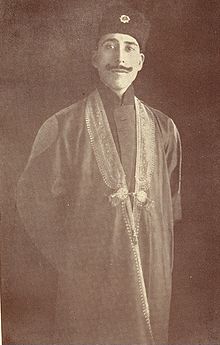58:"THE NAWAB OF SARDHANA On account of services rendered to Alexander Barnes in his Kabul mission, and subsequently to the English in their retreat from Kabul, they were expelled from Kabul and settled at Sardhana. At the time of the Mutiny, the head of the family, Sayyid Muhammed Jan Fishan Khan Seheb, took the side of the government at once. When the Mutiny occurred at Meerut, he raised a body of horse, consisting of his followers and dependents, and officered by himself and his relatives; accompanied General Wilson’s force to the Hindan; was present in both actions, and thence to Delhi, where he remained with the headquarters camp till the city was taken, when his men were employed to keep order in Delhi. For these eminent services the title of Nawab, with a suitable khilat was conferred on him. And each of his successors have received the title of Nawab for life on succeeding to the estates."
68:
84:
76:
153:
47:. While these lands have mostly now been dispensed of, the descendants of Jan Fishan Khan retain the right to use the title, Nawab of Sardhana.
120:
158:
143:
36:
50:
An account of the awarding of the title, Nawab of
Sardhana, was provided by the British colonial scholar Sir
148:
138:
121:
Page 13: The Golden Book of India, by Sir Roper
Lethbridge. McMillan & Co., 1893, London.
51:
32:
92:
28:
27:
title bestowed upon the descendants of the Afghan noble chieftain (nawab) and statesman
102:
132:
44:
67:
83:
75:
43:
at
Sardhana, made up largely of ancestral lands which once belonging to the
98:• Saiyed Ali Shah . Saiyed Ahmed Shah . Saiyed Amjad Ali Shah
19:
24:
82:
74:
66:
40:
31:, for services to the British Raj – both in the failed British
39:. The hereditary title was once accompanied by a large
8:
113:
63:Holders of the title Nawab of Sardhana
7:
54:, in his The Golden Book of India:
14:
95:. Saiyed Muhammed Ali Shah
154:Indian people of Afghan descent
1:
87:Saiyed Sirdar Ikbal Ali Shah
175:
35:, as well as during the
91:• Saiyed Muhammad Shah
37:1857 Rebellion in India
88:
80:
72:
71:Saiyed Jan-Fishan Khan
60:
86:
79:Saiyed Amjad Ali Shah
78:
70:
56:
89:
81:
73:
159:Pashtun dynasties
166:
123:
118:
101:• Saiyed Sirdar
52:Roper Lethbridge
33:Afghan campaigns
174:
173:
169:
168:
167:
165:
164:
163:
144:Afghan warlords
129:
128:
127:
126:
119:
115:
110:
93:Jan-Fishan Khan
65:
29:Jan-Fishan Khan
23:is an honorary
12:
11:
5:
172:
170:
162:
161:
156:
151:
149:Indian Muslims
146:
141:
131:
130:
125:
124:
112:
111:
109:
106:
103:Ikbal Ali Shah
64:
61:
13:
10:
9:
6:
4:
3:
2:
171:
160:
157:
155:
152:
150:
147:
145:
142:
140:
137:
136:
134:
122:
117:
114:
107:
105:
104:
99:
96:
94:
85:
77:
69:
62:
59:
55:
53:
48:
46:
42:
38:
34:
30:
26:
22:
21:
116:
100:
97:
90:
57:
49:
17:
15:
139:Shah family
45:Begum Samru
133:Categories
108:References
18:Nawab of
20:Sardhana
25:Muslim
41:jagir
16:The
135::
Text is available under the Creative Commons Attribution-ShareAlike License. Additional terms may apply.


